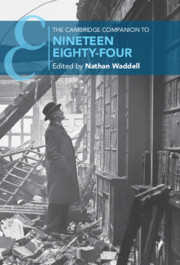Book contents
- The Cambridge Companion to Nineteen Eighty-Four
- The Cambridge Companion to Nineteen Eighty-Four
- Copyright page
- Contents
- Figures
- Contributors
- Acknowledgements
- Chronology
- Abbreviations
- Introduction
- Part I Contexts
- Part II Histories
- Part III Questions
- 9 Europe, Refugees, and Nineteen Eighty-Four
- 10 The Problem of Hope
- 11 Oceania’s Dirt
- 12 Room 101
- Part IV Media
- Further Reading
- Index
- Cambridge Companions to …
10 - The Problem of Hope
Orwell’s Workers
from Part III - Questions
Published online by Cambridge University Press: 18 September 2020
- The Cambridge Companion to Nineteen Eighty-Four
- The Cambridge Companion to Nineteen Eighty-Four
- Copyright page
- Contents
- Figures
- Contributors
- Acknowledgements
- Chronology
- Abbreviations
- Introduction
- Part I Contexts
- Part II Histories
- Part III Questions
- 9 Europe, Refugees, and Nineteen Eighty-Four
- 10 The Problem of Hope
- 11 Oceania’s Dirt
- 12 Room 101
- Part IV Media
- Further Reading
- Index
- Cambridge Companions to …
Summary
‘If there is hope, […] it lies in the proles.’ Thus writes Winston Smith in his secret diary, in one of the most famous formulations from Nineteen Eighty-Four (1949). This chapter takes a historical and historicist view of this remark, situating Winston’s and the novel’s account of the Oceanian proletariat in relation to Orwell’s understanding of the economico-political predicament of the working class in the 1930s and 1940s. The chapter considers the highly contentious bind into which Nineteen Eighty-Four puts the so-called ‘proles’, a group it constructs from a largely exterior point of view: caught between Winston’s belief in that group’s inevitable, albeit temporally distant, victory, and O’Brien’s insistence that the alleged ‘animalism’ of the proletariat will prevent it from gaining any kind of purchase on the future. I first outline how Orwell’s thinking on the relationship between socialism and the working class developed through the 1930s and 1940s, from The Road to Wigan Pier to the welfare state. I then discuss the moral and reproductive functions ascribed to the proles in the novel in light of Orwell’s political commitments, before addressing the question of whether the novel despairs of class politics, as thinkers such as Raymond Williams have argued.
- Type
- Chapter
- Information
- The Cambridge Companion to Nineteen Eighty-Four , pp. 155 - 167Publisher: Cambridge University PressPrint publication year: 2020
- 2
- Cited by

